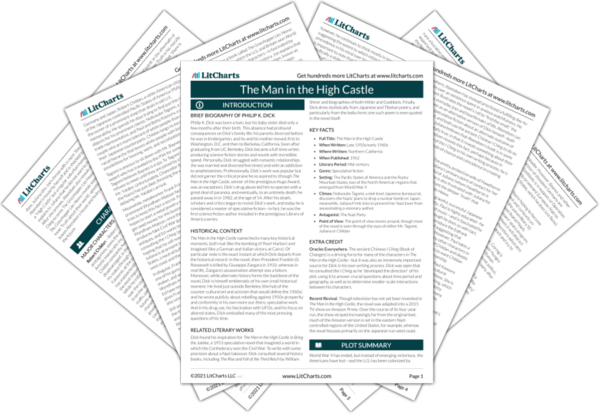The various mentions of TV and rockets represent the way the Nazi priorities diverge from American ones, even in seemingly apolitical ways. In 1962, when The Man in the High Castle was published, televisions sets were becoming a common fixture in American homes; by contrast, it would be another seven years before the first rocket would successfully head into space. In the novel, however, television has yet to be invented, while rockets have become routine—the Germans make regular space trips, and rockets have replaced airplanes as the fastest mode of commercial travel. As Juliana puts it, “if those Nazis can fly back and forth between here and Mars, why can’t they get television going?”
In real life TV is as essential part of U.S. culture; the country’s emphasis on television suggests that its citizens value entertainment, and that they will prioritize technologies designed to be used in the home. However, as The Grasshopper Lies Heavy makes clear, TV can have more than simply entertainment value: in that book within a book, the U.S. ships its televisions around the world, earning cultural loyalty that then translates into political power (what is sometimes called “soft power”). If TV therefore symbolizes an American view of conquest, rockets reflect a distinctly Nazi ideology. To the Nazis, rockets are a means of colonizing even more territory, extending the empire that they fought so hard to build in World War II. These rockets demonstrate that the Reich is prioritizing geographic conquest and scientific superiority; Baynes reflects that to the German leaders, “they see through the here, the now, into the vast black deep beyond.” Thus the contrast between American TV and Nazi rockets reveals that Americans focus on reaching people in their daily lives, while Nazis are less interested in the “here [and] now.” Instead, the Reich merely wants more territory—even when that territory is devoid of human beings.
TV and Rockets Quotes in The Man in the High Castle
Their view; it is cosmic. Not of a man here, a child there, but an abstraction: race, land. Volk. Land. Blut. Ehre. Not of honorable men but of Ehre itself, honor; the abstract is real, the actual is invisible to them. Die Gute, but not good men, this good man. It is their sense of space and time. They see through the here, the now, into the vast black deep beyond, the unchanging. And that is fatal to life […] What they do not comprehend is man’s helplessness. I am weak, small, of no consequence to the universe. It does not notice me; I live on unseen.
I wonder what it’s like to sit home in your living room and see the whole world on a little gray glass tube. If those Nazis can fly back and forth between here and Mars, why can’t they get television going? I think I’d prefer that, to watch those comedy shows, actually see what Bob Hope and Durante look like, than to walk around on Mars.
But he had to remain where he was, in San Francisco. Still trying to arrange the meeting for which he had come. Forty-five minutes by Lufthansa rocket from Berlin, and now this. A weird time in which we are alive. We can travel anywhere we want, even to other planets. And for what? To sit day after day, declining in morale and hope.












